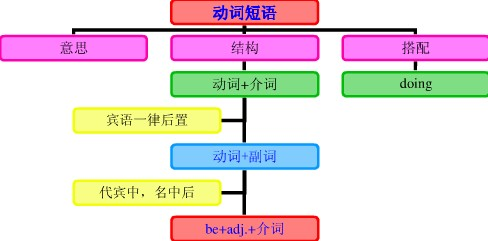本试题 “— I _______becoming a pilot when I was at school.— Really? Do you still think it will____?[ ]A. was dreaming; come truthB. was dreaming of; come tr...” 主要考查您对动词短语
过去进行时
等考点的理解。关于这些考点您可以点击下面的选项卡查看详细档案。
- 动词短语
- 过去进行时
动词短语的概念:
动词常和某些其他词类用在一起,构成固定词组,形成所谓短语动词(phrasalverb)。和动词一样,短语动词也可分为及物和不及物两种。短语动词可以作为一个整体看待,同一般动词一样使用。
动词短语的搭配类型:
1)动词+介词:这类短语动词用作及物动词,后面须跟宾语。
如:The small boy insisted on going with his parents. 那男孩坚持要跟父母一起去。
Do you often listen to broadcasts in English? 你常听英语广播吗?
Look at the children. Aren't they lovely? 看着这些孩子们。他们多么可爱呀!
We stand for self-reliance. 我们是主张自力更生的。
这一类的短语动词还有很多,如depend on(upon)(依靠),wait on(服侍),look for(寻找),deal with(对待),look after(照料),wait for(等待)等。
2)动词+副词:
这类短语动词有的用作及物动词,有的用作不及物动词。
如:I always get up as soon as the bell rings. 我总是一打铃就起床。(不及物)
Look out, there's a car coming! 当心,来汽车了!(不及物)
Have you handed in your exercises already? 你已经交练习了吗?(及物)
Please don't forget to put on your coat, it's cold outside. 请不要忘记穿外衣,外面很冷。(及物)
这一类的短语动词还有很多,及物如put out(扑灭),eat up(吃光),put down(放下);不及物如set off(出发),come up(走近),go on(继续)。
注:"动词+副词"这类短语动词和上面第一类"动词+介词"的不同之处在于:"动词+介词"用作及物动词,后面须跟宾语。"动词+副词"则有的及物,有的不及物;用作及物动词而宾语为人称代词或自身代词时,副词往往放在宾语之后。
如:Please wake me up at five tomorrow. 请在明天早上五点唤醒我。
If you have done your exercises, please hand them in. 如果你们练习做完了请交来。
She doesn't normally behave like that, she's putting it on. 她通常并不如此表现,她是装出来的。
注:这类短语动词有不少可兼作及物和不及物动词用。
如:He took off his hat when he entered the office. 他进办公室后脱下帽子。(及物)
The plane took off at seven sharp. 飞机在七点整起飞。(不及物)
Charlie rang up Neil to ask about the time of the meeting. 查理打电话给尼尔问开会的时间。(及物)
If you can't come, please ring up and let us know. 你如来不了,请来电话告诉我们一声。(不及物)
3)动词+副词+介词:
"动词+副词"之后有的可以再加一个介词,形成另一种短语动词。这类短语动词用作及物动词。
如:Do not give up hope. We must go on with the experiment 不要失望。我们必须继续试验。(go on with继续)
He came up to me. 他走到我跟前。(come up to走近)
这类短语动词还有:look down upon(看不起),do away with(去掉),put up with(忍受)等。
4)动词+名词+介词:
这类短语动词也是及物的。
如:He shook hands with all the guests at the banquet. 他在宴会上和宾客一一握手。
Young pioneers often come to the Children's Palace to take part in after school activities.少先队员经常到少年宫来参加课外活动。
Pay attention to the temperature of the stored rice. 注意仓库里的稻谷的温度。
Her job is taking care of the babies. 她的工作是照顾婴儿。
这一类短语动词还有:put an end to(结束),take notice of(注意),catch hold of(抓住),lose sight of(看不见),make use of(利用)等。
动词短语知识体系:

过去进行时的概念:
过去进行时表示在过去某一时刻或某一段时间内进行或发生的动作。其形式为was /were + V-ing。
常与表示过去的时间状语连用,如:last night, last Saturday等;或者与when, while, as引导的过去时间状语连用。
过去进行时的基本用法:
1、主要表示过去某一时间正在进行的动作:
如:He fell asleep when he was reading. 他看书时睡着了。
We were expecting you yesterday. 我们昨天一直在等你。
He was playing while I was studying. 我在做功课时他在玩。
2、过去进行时表示现在:
用过去进行时表示现在主要是为了使语气委婉、客气。
如:I was wondering if you could give me a lift. 我不知你能否让我搭一下车。
We were hoping you would stay with us. 我们很希望你能跟我们住在一起。
How much did you want to spend, sir? 先生,您打算花多少钱?
【注】一般过去时也有类似用法,但比较而言,用过去进行时显得更客气,更不肯定。
3、过去进行时表示感情色彩:
与现在进行时相似,过去进行时也可表示满意、称赞、惊讶、厌恶等感情色彩,也通常与always, forever, continually等副词连用。
如:They were always quarrelling. 他们老是吵架。
The boy was continually asking questions. 这个男孩子老是问东问西的。
4、动词be的过去进行时:
动词be的进行时也可表示过去一时的表现或暂时的状态。
如:He was friendly. 他很友好。(指过去长期如此)
He was being friendly. 他当时显得很友好。(指当时一时的表现)
过去进行时与一般过去时的区别:
(1)过去进行时强调动作在过去某时刻正在进行或持续,而一般过去时表示动作的完成。
如:He was writing his composition last night. 他昨晚在写作文。(不一定写完)
He wrote his composition last night. 他昨晚写了一篇作文。(已经写完)
(2)表示过去的状态、感觉及心理活动的静态动词(如be, like, love, hate, fear, own, hear, see, know, want, notice)可用于一般过去时,但通常不用于进行时。
如:I hated it when a man spoke with his mouth full of food. 我讨厌人们说话时口里含着食物。
(3)一般过去时与always, constantly, forever, continually等连用,表示“过去经常性、习惯性的动作”;
而过去进行时与always, constantly, forever, continually等连用,表示动作的重复,常带有感情的色彩。
如: He always got up at six. 他过去总是六点起床。
He was always thinking of his work. 他总是一心想到工作。
(4)有时过去进行时可以用来替换一般过去时,但一般过去时表示主语的行为是经过认真考虑的;
而过去进行时表示一种较随便或没有进行仔细考虑的行为。
如:I thought that he would agree with us. 我原以为它会同意我们的。
I was thinking of persuading him to follow my advice. 我想到了要说服他接受我们的建议。
注:下面几种情况不用一般过去时而要用过去进行时:
1、表示过去某一阶段暂时性的习惯动作时。
如:Tom was getting up at six o'clock every day that week. 汤姆那一周里每天都是六点钟起床。
2、与always连用表示赞美,厌烦等感情色彩时。
如:John was always coming to school late. 约翰上学总是迟到。
LeiFeng was always doing good deeds for the people. 雷锋总是为人民做好事。
3、用来描写故事发生的情景时。
如:It was a dark night. The wind was blowing hard and the rain was falling heavily. A PLA man suddenly appeared on the river bank. He wanted to cross the river.
那是一个漆黑的夜晚,风刮得很厉害,雨下得很大,一个解放军战士突然出现在河岸上,他想过河去。
4、when作并列连词,表示“(这时)突然”之意时,第一个并列分句用过去进行时,when引导的并列分句用一般过去时。
如:I was taking a walk when I met him. 我正在散步,突然遇见了他。
We were playing outside when it began to rain. 我们正在外边玩,这时下起雨来了。
5、go, come, leave, start, arrive等动词可用过去进行时表示过去将来的含义。
如:I was leaving for Wuhan that day. 那天我正要去武汉。
She was coming later. 她随后就来。
与“— I _______becoming a pilot when I was at school.— Really...”考查相似的试题有:
- The old man said that he would ________ more people who would not have too much work to do in the week to come to do ...
- It is high time for us to take measures to protect these old traditions and customs before they _____.A.die outB.di...
- I can't understand it, will you please _____ once more?A.explain that wordB.repeat that wordC.explain us that word...
- —Oh,my God! It’s a sea of bike,How Can you your bike?—That’s easy.My brake went wrong , besides I tied a red ribbo...
- Every possible use of time should be ____ to look into the case.[ ]A. usedB. madeC. builtD. taken
- The classroom can ________ 50 students.A.sitB.satC.seatD.seats
- 根据汉语提示完成句子。1. The passengers were warned to ____(当心)thieves.2.Would you please____(照 看)my bag?3.______...
- I suppose we’ll have to, bad weather conditions, spend more than 500 days undertaking the construction.A.considering...
- The new administration has promised people to ______ administrative expenses by ten percent nextyear.[ ]A. cut downB....
- With science and technology advancing, plentiful kinds of medicines are being developed to _____ us of our pain cause...